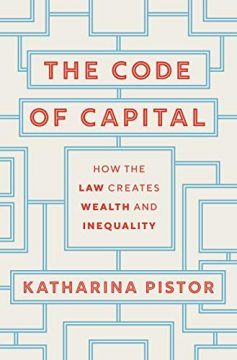Adam Tooze in the New York Review of Books:
 “There is an estate in the realm more powerful than either your Lordship or the other House of Parliament,” one Lord Campbell proclaimed to the peers in the House of Lords, in 1851, “and that [is] the country solicitors.” It was the lawyers, in other words, who kept England’s landed elite so very, well, elite: who shielded and extended the wealth of the landowners, even granting them legal protection against their own creditors. How did they pull off this trick? Through a nimble tangle of contracts, carefully and complicatedly applied, as Katharina Pistor explains in her lucid new book, The Code of Capital: by mixing “modern notions of individual property rights with feudalist restrictions on alienability”; by employing trusts “to protect family estates, but then [turning] around and [using] the trust again to set aside assets for creditors so that they would roll over the debt of the life tenant one more time”; and by settling the rights to the estate among family members in line for inheritance. Solicitors maximized their clients’ profits and worth through strategic applications of the central institutions at their disposal: “contract, property, collateral, trust, corporate, and bankruptcy law,” what Pistor calls an “empire of law.”
“There is an estate in the realm more powerful than either your Lordship or the other House of Parliament,” one Lord Campbell proclaimed to the peers in the House of Lords, in 1851, “and that [is] the country solicitors.” It was the lawyers, in other words, who kept England’s landed elite so very, well, elite: who shielded and extended the wealth of the landowners, even granting them legal protection against their own creditors. How did they pull off this trick? Through a nimble tangle of contracts, carefully and complicatedly applied, as Katharina Pistor explains in her lucid new book, The Code of Capital: by mixing “modern notions of individual property rights with feudalist restrictions on alienability”; by employing trusts “to protect family estates, but then [turning] around and [using] the trust again to set aside assets for creditors so that they would roll over the debt of the life tenant one more time”; and by settling the rights to the estate among family members in line for inheritance. Solicitors maximized their clients’ profits and worth through strategic applications of the central institutions at their disposal: “contract, property, collateral, trust, corporate, and bankruptcy law,” what Pistor calls an “empire of law.”
The landowners themselves may not have understood this morass of legal relationships, this web, in Pistor’s words, of “claims and counterclaims, rights and restrictions on these rights.” No matter: by lawyers’ legal codifications, their wealth was increasing. The sort of legal logic applied in nineteenth-century England grows only more complicated, and more profit-generating, when the asset in question is not a hectare of country land but stocks and bonds and shares—when an entire organization is coded as a legal person (who can own assets and who can sue) through incorporation.
More here.
